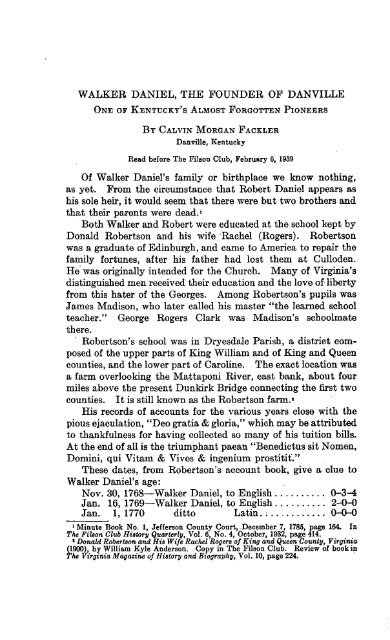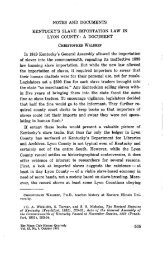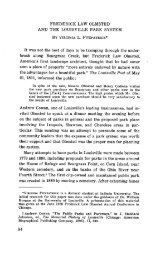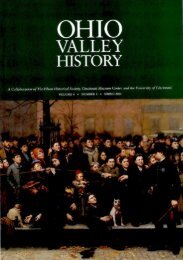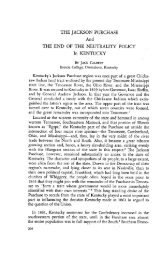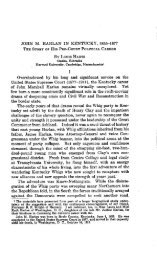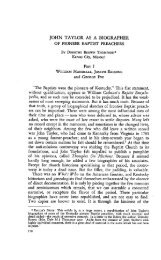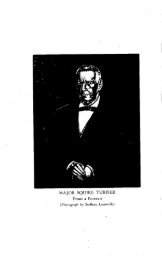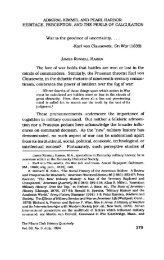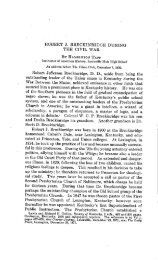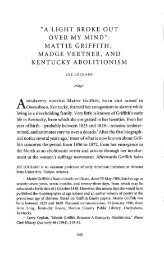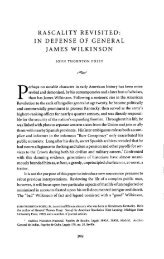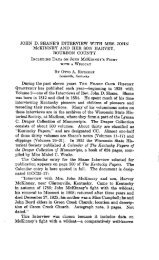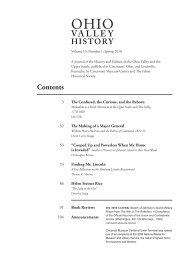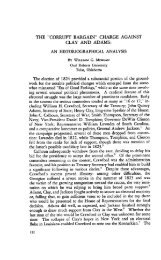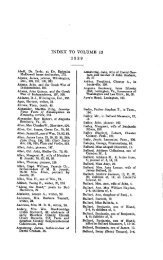Walker Daniel, the Founder of Danville - The Filson Historical Society
Walker Daniel, the Founder of Danville - The Filson Historical Society
Walker Daniel, the Founder of Danville - The Filson Historical Society
You also want an ePaper? Increase the reach of your titles
YUMPU automatically turns print PDFs into web optimized ePapers that Google loves.
WALKER DANIEL, THE FOUNDER OF DANVILLE<br />
ONE OF KENTUCKY'S ALMOST FORGOTTEN PIONEERS<br />
BY CALVIN I ORGAN FACKLER<br />
<strong>Danville</strong> Kentucky<br />
Read before <strong>The</strong> <strong>Filson</strong> Club, February 6, 1939<br />
Of <strong>Walker</strong> <strong>Daniel</strong>'s family or birthplace we know nothing,<br />
as yet. From <strong>the</strong> circumstance that Robert <strong>Daniel</strong> appears as<br />
his sole heir, it would seem that <strong>the</strong>re were but two bro<strong>the</strong>rs and<br />
that <strong>the</strong>ir parents were dead. 1<br />
Both <strong>Walker</strong> and Robert were educated at <strong>the</strong> school kept by<br />
Donald Robertson and his wife Rachel (Rogers). Robertson<br />
was a graduate <strong>of</strong> Edinburgh, and came to America to repair <strong>the</strong><br />
family fortunes, after his fa<strong>the</strong>r had lost <strong>the</strong>m at CuUoden.<br />
He was originally intended for <strong>the</strong> Church. Many <strong>of</strong> Virginia's<br />
distinguished men received <strong>the</strong>ir education and <strong>the</strong> love <strong>of</strong> liberty<br />
from this hater <strong>of</strong> <strong>the</strong> Georges. Among Robertson's pupils was<br />
James Madison, who later called his master "<strong>the</strong> learned school<br />
teacher." George Rogers Clark was Madison's schoolmate<br />
<strong>the</strong>re.<br />
Robertson's school was in Dryesdale Parish, a district composed<br />
<strong>of</strong> <strong>the</strong> upper parts <strong>of</strong> King William and <strong>of</strong> King and Queen<br />
counties, and <strong>the</strong> lower part <strong>of</strong> Carohne. <strong>The</strong> exact location was<br />
a farm overlooking <strong>the</strong> Mattaponi River, east bank, about four<br />
miles above <strong>the</strong> present Dunkirk Bridge connecting <strong>the</strong> first two<br />
counties. It is still known as <strong>the</strong> Robertson farm.,<br />
His records <strong>of</strong> accounts for <strong>the</strong> various years close with <strong>the</strong><br />
pious ejaculation, "Deo gratia & gloria," which may be attributed<br />
to thankfulness for having collected so many <strong>of</strong> his tuition bills.<br />
At <strong>the</strong> end <strong>of</strong> all is <strong>the</strong> triumphant paean "Benedictus sit Nomen,<br />
Domini, qui Vitam & Vives & ingenium prostiti ."<br />
<strong>The</strong>se dates, from Robertson's account book, give a clue to<br />
<strong>Walker</strong> <strong>Daniel</strong>'s age:<br />
Nov. 30, 1768--<strong>Walker</strong> <strong>Daniel</strong>, to English.. ........ 0-3-4<br />
Jan. 16, 1769--<strong>Walker</strong> <strong>Daniel</strong>, to English .......... 2-4)-0<br />
Jan. 1, 1770 ditto Latin. : ........... 0-0-0<br />
Minute Book No. 1, Jefferson County Court, December 7, 1785, page 164. In<br />
<strong>The</strong> FiLson Club History Quarterly, Vol. 6, No. 4j October, 1932, page 414.<br />
s Donald Robert en and Hi8 Wife Rachel Ragers <strong>of</strong> King and Queen Ceunly, Virginia<br />
(1900), by William Kyle Anderson. Copy in <strong>The</strong> <strong>Filson</strong> Club. Review <strong>of</strong> book in<br />
<strong>The</strong> Virginia Magazine <strong>of</strong> History and Biography, Vol. 10, page 224.
1939] <strong>Walker</strong> <strong>Daniel</strong>, <strong>Founder</strong> <strong>of</strong> <strong>Danville</strong> 135<br />
Robert <strong>Daniel</strong> is shown in 1772 and 1773.,<br />
<strong>The</strong> <strong>Daniel</strong> boys came several years after Clark and Madison<br />
had left. At <strong>the</strong> time <strong>of</strong> <strong>Walker</strong>'s death, in 1784, Madison was<br />
thirty-four and Clark thirty-three. So <strong>Walker</strong> <strong>Daniel</strong> must<br />
have been still in his twenties when he died.<br />
Broadly speaking, <strong>the</strong> early immigrants to Kentucky consisted<br />
<strong>of</strong> game hunters and land seekers--also young men <strong>of</strong> ambition,<br />
largely lawyers. Of this second class few gave greater promise<br />
than <strong>the</strong> talented Virginian whose life ended before it had fairly<br />
flowered. And our historians have almost ignored him.<br />
Collins in his Kentucky gives two scant notices:<br />
"<strong>Danville</strong> . . . [was] laid <strong>of</strong>f as a town by <strong>Walker</strong> <strong>Daniel</strong> in<br />
1781." Collins' date certainly is wrong.'<br />
"<strong>Walker</strong> <strong>Daniel</strong>, a young lawyer from Virginia, came to Boyle,<br />
<strong>the</strong>n Lincoln, in 1781, and entered upon <strong>the</strong> practice <strong>of</strong> his pr<strong>of</strong>ession.<br />
His only competitor at that period was Christopher<br />
Greenup, afterwards governor <strong>of</strong> <strong>the</strong> State. Mr. <strong>Daniel</strong> was <strong>the</strong><br />
original proprietor <strong>of</strong> <strong>the</strong> town <strong>of</strong> <strong>Danville</strong>, and succeeded in<br />
laying <strong>the</strong> foundation <strong>of</strong> an extensive fortune. He was killed by<br />
<strong>the</strong> Indians in August, 1784, after a short residence <strong>of</strong> three years.<br />
From an old pioneer <strong>of</strong> Mercer, we learn that Mr. <strong>Daniel</strong> was a<br />
young gentleman <strong>of</strong> rare talents, and gave promise <strong>of</strong> great distinction."<br />
<strong>The</strong> "extensive fortune" hardly got beyond <strong>the</strong> foundation<br />
stage, but <strong>the</strong> testimony <strong>of</strong> "an old pioneer <strong>of</strong> Mercer," name<br />
undisclosed, can be accepted since it is in line with that <strong>of</strong> <strong>the</strong><br />
more specific witnesses cited in this paper. Judge Lewis Collins'<br />
"saddle-bag investigations" saved much history for us. O<strong>the</strong>r<br />
historians, including Humphrey Marshall, may be dismissed<br />
without comment since we have <strong>the</strong> original sources from which<br />
<strong>the</strong>y drew, as well as some <strong>of</strong> which <strong>the</strong>y seem to have been<br />
ignorant.<br />
When did <strong>Walker</strong> <strong>Daniel</strong> come to Kentucky? Collins says<br />
"1781," but <strong>the</strong> Virginia records show that he was one <strong>of</strong> <strong>the</strong><br />
representatives from Halifax County in <strong>the</strong> House <strong>of</strong> Delegates<br />
for <strong>the</strong> session that began in May, 1782, and continued through<br />
October 21-December 28, same year.,<br />
l,,Extracts from <strong>the</strong> Account Book <strong>of</strong> Donald Robertson's School, 1758-17699"<br />
<strong>The</strong> Virginia Magazine <strong>of</strong> History and Biography, Vol. 34, pages 148, 232, 234, 235,<br />
and Vol. 35, page 55.<br />
4 History <strong>of</strong> Kentucky, by <strong>the</strong> late Lewis Collins, revised, ete.,by his son Richard<br />
H. Collins. In two volumes. 1874 and subsequent reprints. Vol. 2, page 18.<br />
6 Collins' History <strong>of</strong> Kentucky, Vol. 2, chapter on Boyle County, page 90.<br />
Letter, December 20, 1938, from Wflmer L. Hall. Librarian Virginia State<br />
Library: Presumably"House Journal " since he says ']Journals <strong>of</strong> <strong>the</strong> May session<br />
are net extant, so far as we know.
136 <strong>The</strong> <strong>Filson</strong> Club History Quarterly [Vol. 13<br />
<strong>The</strong> missing years are about a dozen. We still do not know<br />
what his military service was, though he seems to have had <strong>the</strong><br />
rank <strong>of</strong> Major.,<br />
Whe<strong>the</strong>r he was born in Halifax or migrated <strong>the</strong>re, is now<br />
unknown. In an a'tr-line it is over a hundred miles from <strong>the</strong><br />
Mattaponi to <strong>the</strong> Dan. In Halifax <strong>the</strong> Piedmont begins to roll<br />
up to <strong>the</strong> western barrier, a constant temptation to an adventurous<br />
spirit.<br />
<strong>The</strong> Virginia State Librarian recently wrote me: "<strong>The</strong>re are<br />
a considerable number <strong>of</strong> references to <strong>Walker</strong> <strong>Daniel</strong> in various<br />
sources, particularly in E. G. Swem's Virginia Hislorical Index.<br />
We have examined a number <strong>of</strong> <strong>the</strong>se references without finding<br />
personal or biographical information.", So have we, with <strong>the</strong><br />
same result.<br />
Probably his first act upon reaching Kentucky was to open a<br />
store, for he was engaged in trade as well as in law. George<br />
May, Isaac Hite and Willis Green seem to have been in partnership<br />
with him (see agreement dated December 10, 1782) and<br />
Green seems to have withdrawn in February, 1783., Later he<br />
entered into a contract with <strong>Daniel</strong> Broadhead which specified<br />
that his interest in <strong>the</strong> pr<strong>of</strong>its was not to begin "until <strong>the</strong> spring<br />
flood in <strong>the</strong> Ohio in 1785." Before that time <strong>Walker</strong> <strong>Daniel</strong><br />
had been borne away by ano<strong>the</strong>r tide.<br />
For a long while we thought that his store was located at or<br />
near what later became Stanford, but it may have been "<strong>the</strong><br />
town lands <strong>of</strong> <strong>Danville</strong>." <strong>The</strong> inventories filed by his wlministrators<br />
simply say "Lincoln," which county <strong>the</strong>n embraced a<br />
great deal <strong>of</strong> territory, about one-third <strong>of</strong> our present State; but<br />
Abram Irvine, Robert Caldwell and Thomas Allin, <strong>the</strong> appraisers,<br />
all resided ei<strong>the</strong>r in or near <strong>Danville</strong>. That's significant!<br />
<strong>The</strong> first report was filed February 20, 1787. 0 It shows a<br />
ra<strong>the</strong>r meager stock, chiefly remnants <strong>of</strong> drygoods; but much<br />
must have been sold <strong>of</strong>f before <strong>the</strong>n, for <strong>the</strong> sale <strong>of</strong> October 16, 17,<br />
1784, netted £190, 7 shillings and 11 pence. This most likely<br />
was our first bargain sale, and doubtless was well patronized by<br />
<strong>the</strong> few ladies <strong>of</strong> <strong>the</strong> neighborhood. <strong>The</strong> following luxuries<br />
See account given in Conquest <strong>of</strong> <strong>the</strong> Country Northwest <strong>of</strong> <strong>the</strong> Ohio River, 1778-<br />
1783 and <strong>the</strong> Life <strong>of</strong> George Rogers Clark, by William Hayden English. 1896. 2Vols.<br />
Vol. 2, pages 855 1075, 1068, 1077.<br />
s See footnote No. 0.<br />
i Deed Book "A," Supreme Court, Kentucky District (Now Court. <strong>of</strong> Appeals,<br />
Clerk's Office Frankfort) page 211.<br />
Will Book A, Lincoln County, Clerk s Office, pages 141-147.
1939] <strong>Walker</strong> <strong>Daniel</strong>, <strong>Founder</strong> <strong>of</strong> <strong>Danville</strong> 137<br />
appear: "19 watch chains; 9 watch seals; 6 pairs <strong>of</strong> silk knee<br />
bands."<br />
<strong>The</strong> last item was possibly with an eye to Colonel Joshua<br />
Barbee, who was '% very elegant and courtly gentleman, and<br />
adhered to <strong>the</strong> old-style dress <strong>of</strong> ruffled shirt, knee breeches, silk<br />
stockings, and silver shoe-buckles."-<br />
But this venture had proved pr<strong>of</strong>itable, for <strong>the</strong> second inventory,<br />
filed November 28, 1789, recounts, among o<strong>the</strong>i" things :1,<br />
Cash found in <strong>Walker</strong> <strong>Daniel</strong>'s chest.......... £65<br />
In his pocket............................... 12-19<br />
In <strong>the</strong> store ................................ 4-10- 6<br />
Bonds due his estate, Nov. 1, 1784............ 147-11-12 ½<br />
Amt. Bal. on store ledger ....................242- 4- 7<br />
<strong>The</strong> coming <strong>of</strong> <strong>the</strong> District Court inspired <strong>the</strong> following entry:<br />
"<strong>Walker</strong> <strong>Daniel</strong> produced a commission from under <strong>the</strong> hand<br />
<strong>of</strong> his Excellency, appointing him an attorney, which was read,<br />
whereupon he took <strong>the</strong> oaths prescribed by law," February term,<br />
1783.,, And <strong>the</strong> same book shows that he was appointed one <strong>of</strong><br />
his deputies by County Surveyor James Thompson; was examined<br />
by John Cowan and Gabriel Madison, and was reported<br />
"able and qualified.",,<br />
<strong>The</strong> newly organized District Court convened at Harrodsburg<br />
on March 4, 1783, and, taking note <strong>of</strong> <strong>the</strong> lack <strong>of</strong> accom*<br />
modations <strong>the</strong>re, immediately adjourned to <strong>the</strong> Dutch Meeting<br />
House for <strong>the</strong> remainder <strong>of</strong> <strong>the</strong> term, two days.,,<br />
<strong>Walker</strong> <strong>Daniel</strong> and Christopher Greenup were sworn in as<br />
attorneys. <strong>The</strong>n <strong>Daniel</strong> was appointed Attorney General, with<br />
John May as <strong>the</strong> Clerk. <strong>Daniel</strong> was instructed to procure a seal<br />
for <strong>the</strong> Court--<strong>of</strong> which more anon. And <strong>the</strong>ir Honors, John<br />
Floyd and Samuel McDowell, taking cognizance <strong>of</strong> <strong>the</strong> need for<br />
proper equipment, commissioned <strong>the</strong> Attorney General and <strong>the</strong><br />
Clerk as follows:<br />
"<strong>The</strong> Court doth authorize and appoint <strong>Walker</strong> <strong>Daniel</strong> and<br />
John May to make choice <strong>of</strong> a proper and safe place for holding<br />
<strong>the</strong>ir terms, somewhere in <strong>the</strong> neighborhood <strong>of</strong> John Crow's<br />
Station; and to employ persons to build a log courthouse large<br />
enough for a Court room in one end and two jury rooms in <strong>the</strong><br />
l, <strong>The</strong> Political Club, Dan illej by Thomas Speed, <strong>The</strong> <strong>Filson</strong> Club Publicatloas<br />
No. 9 (1894), page 84.<br />
,2 Same as footnote No. 10, pages 188, 187.<br />
l: Order Book No. 1, Lincoln County Court, page 225.<br />
14 Ibid., page 131.<br />
l Order Book No. i Supreme Courtj Kentucky District March 5, 1783 pages<br />
10, I1.
138 <strong>The</strong> <strong>Filson</strong> Club History Quarterly [Vol. 13<br />
o<strong>the</strong>r, on <strong>the</strong> lower floor, and a prison <strong>of</strong> hewed or sawed logs, not<br />
less than nine inches thick. And in case said <strong>Daniel</strong> and May<br />
at <strong>the</strong>ir expense cause such buildings to be erected <strong>the</strong> Court<br />
engages that <strong>the</strong>y will adjourn to <strong>the</strong> place erected so to be<br />
chosen, and hold <strong>the</strong>ir Sessions <strong>the</strong>re 'till it shall be ordered o<strong>the</strong>rwise<br />
by <strong>the</strong> General Assembly."<br />
<strong>The</strong>ir Honors made a liberal gesture by adding:<br />
"And that whenever <strong>the</strong> Court shall be moved from such<br />
place, <strong>the</strong>y will use <strong>the</strong>ir endeavours with <strong>the</strong> General Assembly<br />
to have said <strong>Daniel</strong> and May reimbursed <strong>the</strong>ir expenses incurred<br />
in erecting such buildings, in case <strong>the</strong> Funds already appropriated<br />
to support such Court shall be insufficient for that purpose. But<br />
if such Funds be sufficient <strong>the</strong>y in that case to appropriate a<br />
sufficient part <strong>the</strong>re<strong>of</strong> to said purpose.",5<br />
May seems to have neglected to attend Court after that first<br />
term; and following some warnings to "Keep his <strong>of</strong>fice within <strong>the</strong><br />
District," <strong>the</strong> Court notes that he has not attended to <strong>the</strong> duties<br />
<strong>of</strong> his <strong>of</strong>fice since <strong>the</strong> month <strong>of</strong> April, 1783, makes good its threat<br />
and appoints Christopher Greenup in his stead.l,<br />
When finally built under Isaac Hitc's supervision, <strong>the</strong> Court<br />
establishment cost <strong>the</strong> stupendous sum <strong>of</strong> £300, Virginia money,<br />
<strong>of</strong> which <strong>the</strong> Jefferson County quota was £43.1,<br />
<strong>Daniel</strong> was next named one <strong>of</strong> <strong>the</strong> trustees for Transylvania,<br />
May, 1783--a ra<strong>the</strong>r precarious honor, it would seem, since six <strong>of</strong><br />
those original trustees fell at <strong>the</strong> hands <strong>of</strong> <strong>the</strong> Indians.is<br />
<strong>The</strong> closing months <strong>of</strong> <strong>Walker</strong> <strong>Daniel</strong>'s life were busy ones,<br />
full <strong>of</strong> both <strong>of</strong>ficial and personal affairs.<br />
Collins gives a good account <strong>of</strong> certain men who came from<br />
<strong>the</strong> North, seeking to cause dissension in Virginia's western lands.<br />
He says:<br />
"Tom Paine wrote a book ridiculing <strong>the</strong> right <strong>of</strong> Virginia to<br />
<strong>the</strong> lands <strong>of</strong> Kentucky, and urging Congress to assume possession<br />
<strong>of</strong> <strong>the</strong> whole country. Two Pennsylvanians, Galloway and<br />
Pomeroy, had imbibed <strong>the</strong> principles <strong>of</strong> this production, and<br />
came to Kentucky to propagate <strong>the</strong>m--Pomeroy to <strong>the</strong> Falls,<br />
and Galloway to Lexington." Men were induced to encroach<br />
upon <strong>the</strong>ir neighbors' holdings with <strong>the</strong> intention <strong>of</strong> appropriating<br />
zl Order Book No. 1, Supreme Court, Kentucky Districtj March 5, 1783, pages<br />
10, I1.<br />
1. Ibid. page 72. March 18, 1785.<br />
7 Dee Book "A," Supreme Court, Kentucky District, page 382.<br />
is See various accounts <strong>of</strong> Transylvania trustees in Annals <strong>of</strong> Transylvania University,<br />
also Transylvania Univeraity, Its Origin, Rise, Decline and Fall by Robert<br />
Peter <strong>The</strong> <strong>Filson</strong> Club Publications No. ll (1896), pages 25j 26.
1939] <strong>Walker</strong> <strong>Daniel</strong>, <strong>Founder</strong> <strong>of</strong> <strong>Danville</strong> 139<br />
<strong>the</strong>m under an Act <strong>of</strong> Congress which Galloway assured <strong>the</strong>m<br />
would soon be promulgated.l,<br />
This is a good opening statement <strong>of</strong> <strong>the</strong> matter, though he<br />
failed to give credit where it was due. So <strong>the</strong> rest is best told<br />
in <strong>the</strong> words <strong>of</strong> <strong>Daniel</strong>, whose connection with <strong>the</strong> prosecution <strong>of</strong><br />
<strong>the</strong>se men <strong>of</strong> Belial was made <strong>the</strong> subject <strong>of</strong> his <strong>of</strong>ficial letters to<br />
Governor Harrison:<br />
<strong>The</strong> first, dated January 19, 1784, relates to Galloway, who<br />
was tried before <strong>the</strong> Fayette County Court, <strong>Daniel</strong> attending as<br />
prosecuting attorney. In brief, he managed to secure a conviction,<br />
and <strong>the</strong> Court imposed a moderate fine, upon which <strong>the</strong> Attorney<br />
General had an execution levied "least <strong>the</strong> Judgment <strong>of</strong> <strong>the</strong><br />
Court should appear only a Bugbear to frighten <strong>the</strong> timid." In<br />
<strong>the</strong> meanwhile Pomeroy sat out, about <strong>the</strong> time <strong>of</strong> <strong>the</strong> trial, with<br />
a number <strong>of</strong> petitions to Congress, and so his prosecution was<br />
postponed for <strong>the</strong> time being.,°<br />
<strong>Daniel</strong>'s second letter to Governor Harrison, dated May 21,<br />
1784, opens with <strong>the</strong> story <strong>of</strong> Pomeroy's trial which took place<br />
before <strong>the</strong> Jefferson County Court. It says, in part:<br />
"I was informed that he had returned from Congress & had<br />
circulated Letters among his adherents calculated to Keep up<br />
<strong>the</strong>ir spirits & expectations: that matters were not yet ripe for<br />
execution, &c, &e. Upon this I went down to Jefferson & as he<br />
had once broke custody without leave, I directed <strong>the</strong> Sheriff once<br />
more to arrest him & bring him into Court, which happened to<br />
sitt at <strong>the</strong> time a full week.<br />
"<strong>The</strong> expectation <strong>of</strong> his Trial, as I had threatened to prosecute<br />
him as soon as he returned, had drawn toge<strong>the</strong>r a number <strong>of</strong> <strong>the</strong><br />
Faction, who appeared very anxious about <strong>the</strong> event. <strong>The</strong>re<br />
was a very crowded Audience during <strong>the</strong> whole Trial 3-5th <strong>of</strong><br />
which I am persuaded were <strong>of</strong> <strong>the</strong> number <strong>of</strong> his Followers, notwithstanding<br />
which <strong>the</strong> most perfect Decorum was observed<br />
throughout. Toge<strong>the</strong>r with <strong>the</strong> Evidence made use <strong>of</strong>, in behalf<br />
<strong>of</strong> <strong>the</strong> Commonwealth, I called on five or six <strong>of</strong> <strong>the</strong> Ringleaders<br />
<strong>of</strong> <strong>the</strong> party, as I could easily pick <strong>the</strong>m out <strong>of</strong> <strong>the</strong> Crowd,<br />
most <strong>of</strong> whom swore to <strong>the</strong> very facts which <strong>the</strong> State Witnesses<br />
declared.<br />
"He was fined 2,000 lbs. <strong>of</strong> Tobacco, <strong>the</strong> extent <strong>of</strong> <strong>the</strong> Law,<br />
and bound to <strong>the</strong> Behavior, with two Sureties, himself in £1,000,<br />
& his Sureties in £500 each....<br />
"I was for a considerable time almost at a loss to know under<br />
what Law he should be punished . . . I <strong>the</strong>refore had recourse<br />
-1 Collins' History <strong>of</strong> Kentucky Vol. 2, chapter on Jefferson County, page 373.<br />
1o Calendar <strong>of</strong> Virginia State ' apers and O<strong>the</strong>r Manuscript, 1785-1784, edited by<br />
Win. P. Palmer. Richmond, Virginia, 1883. Vol. 3, pages 555, 556.
140 <strong>The</strong> <strong>Filson</strong> Club History Quarterly [Vol. 13<br />
to our old Law, almost absolute [sic], for <strong>the</strong> punishment <strong>of</strong><br />
Divulgers <strong>of</strong> false news; and endeavoured to draw a parallel between<br />
our present situation & that <strong>of</strong> our Forefa<strong>the</strong>rs at <strong>the</strong> time<br />
<strong>of</strong> <strong>the</strong> Restoration when this Act passed. I now persuade myself<br />
& hope with your Excellency that we Shall be no longer troubled<br />
with this turbulent and factious set <strong>of</strong> men."<br />
This portion <strong>of</strong> his letter closes with <strong>the</strong> promise to prosecute<br />
Leitch, who had journeyed to Congress with Pomeroy, when he,<br />
too, returned to Kentucky<br />
<strong>The</strong>n <strong>Daniel</strong>, continuing, touches at some length upon <strong>the</strong><br />
Indian situation, and <strong>the</strong> necessity for a general understanding<br />
and treaties with <strong>the</strong> various tribes. He states that, whenever<br />
be was at <strong>the</strong> Falls, he was always invited to take a part in <strong>the</strong><br />
Indian councils where, it would seem, he gave much good advice<br />
to <strong>the</strong> warriors.<br />
He presents some <strong>of</strong> <strong>the</strong> by-products <strong>of</strong> <strong>the</strong> Indian troubles:<br />
"<strong>The</strong> dread <strong>of</strong> <strong>the</strong> Indians produces many Inconveniences<br />
among us. It prevents <strong>the</strong> population and settlement <strong>of</strong> <strong>the</strong><br />
Country, confines our people to Stations, which serves as Beds to<br />
engender Sedition & Discord in, & as excuses for Indolence,<br />
Rags & poverty--For while <strong>the</strong>y see no vigorous & decided steps<br />
taken by Government to prevent <strong>the</strong> cruelties & Depredations<br />
<strong>of</strong> <strong>the</strong> Savages, <strong>the</strong>y are apt to conclude as <strong>the</strong> reason, that those<br />
in Administration feeling nothing for <strong>the</strong>ir sufferings, are consequently<br />
indifferent to <strong>the</strong>ir Situation: <strong>the</strong>y <strong>the</strong>refore wish for a<br />
separation, because <strong>the</strong>y <strong>the</strong>n expect that every one in power will<br />
be equally interested with <strong>the</strong>mselves in securing a friendly Intercourse<br />
with <strong>the</strong>ir troublesome Neighbors: And while <strong>the</strong>y are<br />
shut up in Forts & Stations, on o<strong>the</strong>r men's Lands, <strong>the</strong>y are<br />
extremly unwilling to bestow much labour on Improvements,<br />
which <strong>the</strong>y Know <strong>the</strong>y are not to long enjoy.<br />
"<strong>The</strong> active mind <strong>of</strong> man cannot bear to be unemployed &<br />
immediately is casting about to remove <strong>the</strong> causes <strong>of</strong> <strong>the</strong>ir<br />
present confinement; hence <strong>the</strong>se political parties & factions &<br />
hence so ready an Ear to listen to Tales from <strong>the</strong> Designing in <strong>the</strong><br />
Nor<strong>the</strong>rn States."<br />
<strong>Daniel</strong> <strong>the</strong>n views <strong>the</strong> District's governmental situation:<br />
"Ano<strong>the</strong>r source <strong>of</strong> complaint, which is confined indeed<br />
mostly to <strong>the</strong> better sort <strong>of</strong> people, arises from <strong>the</strong> want <strong>of</strong> energy<br />
in Government, from a Defect <strong>of</strong> Distributive Justice among us.<br />
"<strong>The</strong> Fund appropriated for <strong>the</strong> maintenance <strong>of</strong> <strong>the</strong> Supreme<br />
Court in this District has proved wholly inadequate to <strong>the</strong> End;<br />
So much that <strong>the</strong> Judges have not received £10, apiece for <strong>the</strong>ir<br />
Services: <strong>the</strong>ir attendance cannot be expected unless o<strong>the</strong>r Funds<br />
are granted <strong>the</strong>m. If <strong>the</strong> present gentlemen resign, which I am<br />
informed <strong>the</strong>y have in contemplation unless <strong>the</strong>ir Salaries are
1939] <strong>Walker</strong> <strong>Daniel</strong>, <strong>Founder</strong> <strong>of</strong> <strong>Danville</strong> 141<br />
secured to <strong>the</strong>m, by <strong>the</strong> adoption <strong>of</strong> some o<strong>the</strong>r mode than <strong>the</strong><br />
present, I am greatly at a loss to Know where o<strong>the</strong>rs could be got<br />
to supply <strong>the</strong>ir places.<br />
"Unless men <strong>of</strong> abilities & Integrity fill so high an <strong>of</strong>fice, it<br />
were better for <strong>the</strong> people to annihilate <strong>the</strong> Tribunal & leave<br />
<strong>the</strong>m as <strong>the</strong>y were. Few men <strong>of</strong> capacity here will for some<br />
years be willing to undertake <strong>the</strong> <strong>of</strong>fices, because o<strong>the</strong>r Employments<br />
<strong>of</strong>fer, which afford more lucrative prospects: Something<br />
<strong>the</strong>refore should be clone to induce <strong>the</strong> present members to continue.<br />
If a Dissolution <strong>of</strong> <strong>the</strong> Court takes place, anarchy &<br />
confusion must follow, because faction & error will bring <strong>the</strong><br />
County Court into Contempt: <strong>the</strong>ir authority will immediately<br />
be trampled on & disregard [sic]--Exclusive <strong>of</strong> o<strong>the</strong>r Differences,<br />
pomp & sound have a great influence over <strong>the</strong> minds <strong>of</strong> nine<br />
tenths <strong>of</strong> mankind--In a Frontier too, so remote as ours, to which<br />
<strong>the</strong> Knave & <strong>the</strong> outlaw from every State in <strong>the</strong> Union fly as to an<br />
Asylum, a place <strong>of</strong> Impurity, <strong>the</strong> Springs <strong>of</strong> Government cannot<br />
be too tightly wound up: <strong>the</strong> punishment should tread close on<br />
<strong>the</strong> heels <strong>of</strong> <strong>the</strong> crime: As a state <strong>of</strong> Idleness & Inactivity has<br />
been <strong>the</strong> parent <strong>of</strong> Sedition, So a relaxation in <strong>the</strong> Execution <strong>of</strong><br />
<strong>the</strong> penal Laws <strong>of</strong> <strong>the</strong> State will beget and [sic] unwillingness to<br />
obey any Law at all. Hence we may infer, that if we have no<br />
superintending Court, which we cannot have without Funds to<br />
support it, a Revolution in this Country will ensue, and <strong>the</strong>n no<br />
man can say that he is sure <strong>of</strong> his property an hour.<br />
"I am persuaded that no two thinking men in <strong>the</strong> District, <strong>of</strong><br />
honest disinterested Intentions, at present, wish a separation<br />
from <strong>the</strong> Eastern part <strong>of</strong> <strong>the</strong> State, but if <strong>the</strong> Indians are neglected<br />
and <strong>the</strong> Court unsupported, I am at a loss to say how long<br />
<strong>the</strong>y will continue in <strong>the</strong>ir present Sentiments....<br />
"One thing more I would wish to observe. That as soon as<br />
<strong>the</strong> people are allowed to go out & settle generally on <strong>the</strong>ir own<br />
Farms, Merchants will find it to <strong>the</strong>ir Interest to encourage<br />
Industry. Exports in Tobo., Hemp, Flour, Pork, &c., will<br />
shortly take place & <strong>the</strong>n <strong>the</strong> Inhabitants will be enabled to<br />
render to <strong>the</strong> State in Taxes what <strong>the</strong>y now should draw from it<br />
in Protection. This appears to me to be an object <strong>of</strong> national<br />
concern, <strong>of</strong> sufficient magnitude to merit some attention from<br />
<strong>the</strong> Legislature."s<br />
lqo taint <strong>of</strong> Spanish Conspiracy here or <strong>of</strong> any o<strong>the</strong>r treasonous<br />
project. We question whe<strong>the</strong>r his successor, Harry Inn.is, was<br />
ever so sagacious, unselfish or loyal.<br />
Shortly <strong>the</strong>reafter, June 16, 1784, <strong>Daniel</strong> purchased from<br />
John Crow <strong>the</strong> original bounds <strong>of</strong> <strong>Danville</strong>---seventy-six acres-which<br />
<strong>the</strong> deed recites was for a consideration <strong>of</strong> five shillings,<br />
tantamount to our present "$1. and o<strong>the</strong>r valuable considera-<br />
ii Calendar <strong>of</strong> Virginia State Papers, Vol. 3, pages 584-588.
142 <strong>The</strong> <strong>Filson</strong> Club History Quarterly [Vol. 13<br />
tions." Whe<strong>the</strong>r Crow ever received, or was to receive, more<br />
will never now be known. Ano<strong>the</strong>r puzzle is found in <strong>the</strong> descriptive<br />
clause "Part <strong>of</strong> said John's settlement wherein he now<br />
lives, and is commonly known as '<strong>the</strong> town lands <strong>of</strong> <strong>Danville</strong>.' "<br />
If already known as "<strong>the</strong> town lands <strong>of</strong> <strong>Danville</strong>" before its purchase<br />
by <strong>Daniel</strong>, <strong>the</strong>n <strong>the</strong> question arises for whom was <strong>the</strong> town<br />
named? As this tract abuts upon what was probably Crow's<br />
Station, he was carrying out <strong>the</strong> Court's instructions to <strong>the</strong> full in<br />
locating its buildings.,,<br />
At <strong>the</strong> beginning <strong>of</strong> August, 1784, he again goes to Louisville,<br />
to sit upon <strong>the</strong> Commission for Apportioning <strong>the</strong> lands granted<br />
to <strong>the</strong> Illinois Regiment, which had been recruited in Virginia,<br />
in <strong>the</strong> spring <strong>of</strong> 1779, when it numbered 350 men; was reduced to<br />
130 men in August, 1780; disbanded January 18, 1783. George<br />
Rogers Clark was its colonel.,,<br />
Henning shows <strong>the</strong>se commissioners thus: "William Fleming,<br />
John Edwards, John Campbell, <strong>Walker</strong> <strong>Daniel</strong>, Gentlemen;<br />
George Rogers Clark, John Montgomery, Abraham Chaplin,<br />
John Bailey, Robert Todd, William Clarke, <strong>of</strong>ficers <strong>of</strong> <strong>the</strong> Regiment";<br />
not an invidious distinction; merely shows that <strong>the</strong> latter<br />
were in its service, t'<br />
<strong>Daniel</strong> presided as chairman <strong>of</strong> <strong>the</strong> Board during <strong>the</strong> first<br />
sessions, August 2nd through 7th. As <strong>the</strong>re are no more entries<br />
on <strong>the</strong> Minutes until <strong>the</strong> 16th, when <strong>Daniel</strong>'s death is noted,,,<br />
it would seem that in <strong>the</strong> meantime <strong>the</strong> commission had adjourned<br />
temporarily and that during that time <strong>Daniel</strong> and his<br />
companions George Keightley and William Johnston, went for<br />
a visit to Robert <strong>Daniel</strong> at Bullitt's Liqk, where Robert <strong>Daniel</strong><br />
had taken out a tavern keeper's license.,0<br />
<strong>The</strong>re are several accounts <strong>of</strong> <strong>the</strong> death <strong>of</strong> <strong>Walker</strong> <strong>Daniel</strong>.<br />
Colonel J. Stoddard Johnston, in his two-volume Memorial<br />
History <strong>of</strong> Louisville, publishes two, one in each <strong>of</strong> his volumes.<br />
In <strong>the</strong> first he has <strong>Walker</strong> <strong>Daniel</strong> slain by <strong>the</strong> Indians, and<br />
William Johnston taken prisoner, on <strong>the</strong> road between BuUitt's<br />
Lick and Louisville, but date correct, namely, 1784. Here he<br />
says that William Johnston was thought to have been slain also,<br />
2 Deed Book "A," Lincoln County, Clerk's Office, page 12.<br />
3 Virginia Magazine <strong>of</strong> History and Biography, Vol. 21 page 343.<br />
" Hennina's tatutes, Vol. 11 pages 335, 336.<br />
2m For full account see Conquest <strong>of</strong> <strong>the</strong> Northwest and <strong>the</strong> Life <strong>of</strong> George Rogers Clark.<br />
t* Minute Book No. l, Jefferson County Court April 7, 1784, page 4. In <strong>The</strong> <strong>Filson</strong><br />
Club History Quarterly Vo . 6, No. 1, January 1932, page 42.
1939] <strong>Walker</strong> <strong>Daniel</strong>, <strong>Founder</strong> <strong>of</strong> <strong>Danville</strong> 143<br />
until his reappearance months <strong>the</strong>reafter, when he was released<br />
in Canada, and returned home ragged and footsore.,,<br />
In <strong>the</strong> o<strong>the</strong>r story this writer says <strong>Daniel</strong> and Keightley were<br />
killed and that William Johnston was taken prisoner, but while<br />
returning from a surveying tour upon Nohn and Bacon creeks<br />
in <strong>the</strong> present county <strong>of</strong> Hardin, in 1783.,,<br />
<strong>The</strong>se two conflicting accounts in <strong>the</strong> same historical work<br />
certainly present a confusion. <strong>The</strong> following, headed "William<br />
Johnston, C. Stores, to Gov. Harrison," Falls <strong>of</strong> Ohio, August 14,<br />
1784, gives a contemporary's account <strong>of</strong> <strong>the</strong> death <strong>of</strong> <strong>Walker</strong><br />
<strong>Daniel</strong>:<br />
"Sir . . . This Western Country, perhaps, Sir, has never<br />
sustained a greater Loss, or more deep felt shock in <strong>the</strong> death <strong>of</strong><br />
one man, than it does now in that <strong>of</strong> <strong>Walker</strong> <strong>Daniel</strong> Esquire, who<br />
with a merchant from Ireland by <strong>the</strong> name <strong>of</strong> George Keightley,<br />
on <strong>the</strong> 12th ulto: were Killed and Scalped by <strong>the</strong> Savages. As I<br />
was in Company & had nearly have shared <strong>the</strong> Same unhappy<br />
Fate: (a Ball having glanced my Breast) a concise Relation,<br />
perhaps may not be amiss.<br />
"On <strong>the</strong> morning <strong>of</strong> <strong>the</strong> 12th we left Sullivan's old Station,<br />
on our way to <strong>the</strong> Salt Works at Bullitt's Lick--We had made<br />
some considerable stay at Col: Moore's, at <strong>the</strong> Fish Pools; had<br />
met numbers <strong>of</strong> people who had that day left <strong>the</strong> works, and in<br />
<strong>the</strong> Evening proceeded leisurely on unapprehensive <strong>of</strong> Danger,<br />
"towards our place <strong>of</strong> evening Destination. Within five or six<br />
miles <strong>of</strong> <strong>the</strong> Salt Works, we were fired on by several Savages, to<br />
<strong>the</strong> number <strong>of</strong> Six as near as ,my fears, and <strong>the</strong> momentary<br />
Glance I had <strong>of</strong> <strong>the</strong>m could permit me to distinguish.<br />
"<strong>The</strong> sudden and unexpected sight <strong>of</strong> a Savage stepping from<br />
behind a Tree, and deliberately firing on us, occasioned an<br />
Exclamation <strong>of</strong> <strong>the</strong>re!! from me, who first discovered him, but<br />
<strong>the</strong> word had hardly escaped my Lips, before two or three guns<br />
more were fired on us, and <strong>the</strong> war whoop raised. <strong>The</strong> unfortunate<br />
gentlemen fell dead on <strong>the</strong> spot, having rec'd <strong>the</strong> fatal<br />
Ball thro' <strong>the</strong>ir Hearts--<strong>the</strong> wound I rec'd was not attended with<br />
dangerous Consequences--<strong>the</strong> same Evening <strong>the</strong> dead Gent:<br />
were taken to a house half a mile far<strong>the</strong>r on <strong>the</strong> Road, and <strong>the</strong><br />
day afterwards conveyed to <strong>the</strong> Salt Works for a Burial...."..<br />
William Johnston was <strong>the</strong> Clerk <strong>of</strong> <strong>the</strong> 5efferson County<br />
Court, and lived on <strong>the</strong> Cave Farm, later <strong>the</strong> site <strong>of</strong> Louisville's<br />
Cave Hill Cemetery.,°<br />
2T Memorial History <strong>of</strong> Louisville from its First Settlement to <strong>the</strong> Year 1896, edited by<br />
J. Stoddard Johnston, Vol. 1, page 57.<br />
25 ""<br />
Memorial History <strong>of</strong> Louismlle, Vol. 2, page 642.<br />
ffi2 Calendar <strong>of</strong> Virginia State Papers Vol. 3, page 605.<br />
ao Memorial History <strong>of</strong> Louisville, Vol. 2, page 27.
144 <strong>The</strong> <strong>Filson</strong> Club History Quarterly [Vol. 13<br />
<strong>The</strong> news <strong>of</strong> <strong>the</strong> tragedy must have reached <strong>Danville</strong> very<br />
quickly for those times, for Willis Green in a letter to Governor<br />
Harrison, dated August 21st, 1784, mentions it. <strong>The</strong> editor<br />
comments that "He [Green] enlarges upon <strong>the</strong> great loss to <strong>the</strong><br />
Country by this sad event, and urges <strong>the</strong> appointment <strong>of</strong> a successor<br />
as soon as possible.",,<br />
Doubtless, too, Dr. David Rice delivered <strong>Daniel</strong>'s memorial<br />
sermon shortly afterward, and at that first Meeting House upon<br />
<strong>the</strong> Public Square, though <strong>the</strong> manuscript <strong>of</strong> that sermon shows<br />
nei<strong>the</strong>r date nor place <strong>of</strong> delivery:<br />
Having selected Romans 3:7 for his text, "Fa<strong>the</strong>r David"<br />
Rice begins:<br />
"<strong>The</strong> mournful occasion <strong>of</strong> our presence makes it proper that<br />
we should for a few minutes leave <strong>the</strong> world <strong>of</strong> Vice, <strong>of</strong> empty<br />
Shadows and Pain and Mortality, and launch our Thots into <strong>the</strong><br />
World <strong>of</strong> Spirits, where Immortality reigns and where all is<br />
substantial."<br />
His "a few minutes" was ra<strong>the</strong>r euphemistic: he delivered<br />
a very long Presbyterian sermon upon Immortality and <strong>the</strong><br />
Future Life, not returning to <strong>the</strong> cause <strong>of</strong> <strong>the</strong> ga<strong>the</strong>ring until<br />
near <strong>the</strong> end, when he says:<br />
"We shall now take a brief view <strong>of</strong> some <strong>of</strong> <strong>the</strong> circumstances<br />
relating to Mr. <strong>Walker</strong> <strong>Daniel</strong> and his Death, and endeavour to<br />
make some use <strong>of</strong> <strong>The</strong>m. I mean not to attempt Mr. <strong>Daniel</strong>'s "<br />
Character for I know that I am not quaJified for Panegeriek, and<br />
if I was, I had not sufficient acquaintance with that Gentleman<br />
to enable me to do it with any degree <strong>of</strong> Justice and Precision.<br />
I would only take Notice <strong>of</strong> a few things which naturally tend to<br />
suggest some Useful Thots.<br />
"Mr. <strong>Daniel</strong> was young, he appeared healthy, had a lively<br />
flow <strong>of</strong> animal Spirits, and as fair Prospect <strong>of</strong> long Life & temporal<br />
Happiness as <strong>the</strong> most. Mr. <strong>Daniel</strong> had large Prospects and<br />
raised Expectations <strong>of</strong> Wealth & Honor in this Life. Mr.<br />
<strong>Daniel</strong>'s death was sudden; he had not a moment's warning <strong>of</strong><br />
his approaching Fate. He fell by <strong>the</strong> hands <strong>of</strong> skulking lurking<br />
Savages. Mr. <strong>Daniel</strong> was a pr<strong>of</strong>essed Friend <strong>of</strong> Religion and<br />
was sensible that it was absolutely neeessary for <strong>the</strong> well-being <strong>of</strong><br />
civil <strong>Society</strong>.'"<br />
At that time "Fa<strong>the</strong>r David" had been in <strong>the</strong> community but<br />
a few months, his knowledge <strong>of</strong> <strong>Daniel</strong> was doubtless gained by<br />
<strong>the</strong>ir association as members <strong>of</strong> <strong>the</strong> Board <strong>of</strong> Trustees <strong>of</strong> Transylvania<br />
Seminary, later Transylvania University. But <strong>the</strong><br />
s Same as footnote No. 29.<br />
a2 Manuscript <strong>of</strong> David Rice sermon, in Transylvania College archives.
1939] <strong>Walker</strong> <strong>Daniel</strong>, <strong>Founder</strong> <strong>of</strong> <strong>Danville</strong> 145<br />
verdict <strong>of</strong> those who wrote or spoke concerning <strong>the</strong> deceased<br />
seems to have been unanimous in praise.<br />
Possibly <strong>Daniel</strong>'s collection <strong>of</strong> books might give some insight<br />
to his character. Of <strong>the</strong> fifteen, a dozen were tools <strong>of</strong> his pr<strong>of</strong>ession;<br />
<strong>the</strong> o<strong>the</strong>r three were Rollins' Belle Letters, Sterne's Tr/stram<br />
Shandy and Sherlock's Discourse Concerning Death.<br />
Strange as it now seems, <strong>the</strong> only entries <strong>of</strong> record upon <strong>the</strong><br />
order books <strong>of</strong> <strong>the</strong> District Supreme Court which even remotely<br />
refer to him are <strong>the</strong> following: "George Muter is appointed to<br />
act as attorney for <strong>the</strong> Commonwealth until some legally commissioned<br />
person shall attend to <strong>the</strong> execution <strong>of</strong> that <strong>of</strong>fice.""<br />
And "Ordered that George Muter, Harry Innls and Christopher<br />
Greenup be requested to procure a Seal for <strong>the</strong> use <strong>of</strong> this Court,<br />
with such design as <strong>the</strong>y or any two <strong>of</strong> <strong>the</strong>m think proper, <strong>Walker</strong><br />
<strong>Daniel</strong> Esq. not having procured one before his decease.'"'<br />
And so passed <strong>Walker</strong> Darnel, one <strong>of</strong> <strong>the</strong> brightest, most<br />
promising lives <strong>of</strong> <strong>the</strong> early Western Country.<br />
A POSTSCRIPT, BY R. C. BALLARD THRUSTON<br />
At <strong>the</strong> request <strong>of</strong> Mr. Ro<strong>the</strong>rt, editor <strong>of</strong> <strong>The</strong> <strong>Filson</strong> Club<br />
History Quarterly, I have prepared this brief explanation regarding<br />
<strong>the</strong> two incidents that resulted in two conflicting accounts<br />
pertaining to <strong>the</strong> death <strong>of</strong> <strong>Walker</strong> <strong>Daniel</strong>. When Mr. Fackler<br />
read <strong>the</strong> foregoing paper before <strong>the</strong> Club, <strong>the</strong> Club had a small<br />
old Bible that had been given by Mrs. Lewis G. (Mary Johnston<br />
Fenley) Kaye. In it William Johnston had written a memorandum<br />
in 1783. <strong>The</strong> bearing <strong>of</strong> that memorandum on Mr. Fackler's<br />
paper was, at <strong>the</strong> time, not recognized by us. We now find<br />
that <strong>the</strong> memorandum proves that <strong>the</strong> incident <strong>of</strong> 1783 and <strong>the</strong><br />
one <strong>of</strong> 1784 are two separate affairs.<br />
<strong>The</strong>se two events in <strong>the</strong> life <strong>of</strong> William Johnston, both<br />
connected with Indians, were, unfortunately, confused and<br />
linked toge<strong>the</strong>r as one, and, as such, with variations, <strong>the</strong>y appear<br />
in J. Stoddard Johnston's two-volume Memorial History <strong>of</strong><br />
Louisville. In his Vol. 2, pages 641, 642, he makes <strong>the</strong> event<br />
occur in 1783, and in Vol. 1, page 57, he makes it occur in 1784--and<br />
is SO cited, correctly, in Mr. Fackler's footnotes Nos. 27 and<br />
28. <strong>The</strong> two incidents are as follows:<br />
u Order Book No.l, Supreme Court, Kentucky District, November 2, 1784, page 41.<br />
J' lbld., page 72. March 17, 1785.
146 <strong>The</strong> <strong>Filson</strong> Club History Quarterly [Vol. 13<br />
In <strong>the</strong> first incident--1783--Johnston had been taken prisoner<br />
by <strong>the</strong> Indians. When taken I do not know, nor do I know when<br />
he was released, but traditions have it that he was a prisoner for<br />
some eight months. Whilst a prisoner he was held at Ouatenon,<br />
where Fort Wayne, Indiana, now is. He found among those<br />
Indians a small family Bible which he purchased with a pair <strong>of</strong><br />
silver sleeve-buttons that he had with him. In <strong>the</strong> Bible he<br />
records that fact, also <strong>the</strong> date <strong>of</strong> <strong>the</strong> purchase, 16th <strong>of</strong> April,<br />
1783. That date, it should be noted, was more than a year<br />
before <strong>Walker</strong> <strong>Daniel</strong> was shot. He brought <strong>the</strong> Bible with him<br />
to Kentucky, and, as just stated, it was presented to <strong>The</strong><br />
<strong>Filson</strong> Club a few years ago.<br />
<strong>The</strong> o<strong>the</strong>r incident occurred more than a year later and is<br />
described in a letter William Johnston wrote August 14th, 1784,<br />
to Benjam'm Harrison, <strong>the</strong>n <strong>the</strong> Governor <strong>of</strong> Virginia. Part <strong>of</strong><br />
that letter is quoted by Mr. Fackler. In it Johnston states that<br />
he, <strong>Walker</strong> <strong>Daniel</strong> and one George Keightley left Sullivan's old<br />
Station on Bcargrass Creek on <strong>the</strong> 12th <strong>of</strong> July, 1784, <strong>the</strong>ir<br />
destination being <strong>the</strong> Salt Works <strong>of</strong> Bullitt's Lick. While <strong>the</strong>y<br />
were proceeding towards <strong>the</strong> Salt Works, <strong>the</strong>y Were fired upon by<br />
some Indians. <strong>Walker</strong> <strong>Daniel</strong> and Keightley were killed.<br />
William Johnston was slightly wounded, but made his escape.<br />
<strong>The</strong> two articles in Memorial History <strong>of</strong> Louisville reverse <strong>the</strong><br />
order <strong>of</strong> those events and publish <strong>the</strong>m as one continuous incident,<br />
one account putting <strong>the</strong> event in 1783 and <strong>the</strong> o<strong>the</strong>r in 1784.<br />
<strong>The</strong> killing <strong>of</strong> <strong>Walker</strong> <strong>Daniel</strong> and Keightley, as shown by Mr.<br />
Fackler, took place on July 12, 1784, which was more than a<br />
year after William Johnston had purchased <strong>the</strong> Bible whilst<br />
an Indian captive.


